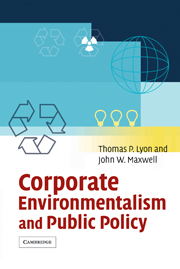Book contents
- Frontmatter
- Contents
- Preface
- Part I The interaction of strategy and policy
- Part II Corporate strategy and the policy life cycle
- Part III Government voluntary programs
- 6 An institutional analysis of voluntary environmental agreements
- 7 Negotiated agreements
- 8 Self-regulation, taxation, and public voluntary agreements
- 9 The design of public voluntary agreements
- 10 Conclusions
- References
- Index
10 - Conclusions
Published online by Cambridge University Press: 10 December 2009
- Frontmatter
- Contents
- Preface
- Part I The interaction of strategy and policy
- Part II Corporate strategy and the policy life cycle
- Part III Government voluntary programs
- 6 An institutional analysis of voluntary environmental agreements
- 7 Negotiated agreements
- 8 Self-regulation, taxation, and public voluntary agreements
- 9 The design of public voluntary agreements
- 10 Conclusions
- References
- Index
Summary
INTRODUCTION
The most notable trend in environmental policy since the 1990s has been the emergence of voluntary approaches to the control of pollution, including both industry self-regulation and non-coercive government programs. In this volume we have presented an integrated perspective in which these two trends can be understood. Indeed, we have argued that corporate environmentalism makes sense only against the backdrop of the public policy process, and that government voluntary programs can be understood only in a political–economic framework that explicitly accounts for corporate strategy. We have developed a set of economic models that captures important facets of the shift toward voluntarism, and have used these models for two purposes. First, we have demonstrated the various ways in which voluntary pollution abatement can be an effective part of a company's overall non-market strategy. Second, we have rigorously explored the circumstances in which voluntarism is likely to be socially beneficial.
In our view, corporate environmentalism is primarily a tool for influencing the behavior of environmental activists, legislators, and regulators, though it may have ancillary benefits such as attracting “green” consumers or reducing costs. Not long ago, business-led environmental initiatives were viewed by many executives as the naive pet projects of “tree-huggers” who had somehow infiltrated the corporate world and were taking advantage of managerial slack to indulge their own private preferences. Today, however, there is growing recognition that corporate environmental initiatives can add substantially to the bottom line. Top executives of Fortune 100 giants such as Alcoa, Dow Chemical, DuPont, Ford, Home Depot, and Procter and Gamble, recognize the importance of corporate environmental strategy and actively use it to create competitive advantage.
- Type
- Chapter
- Information
- Corporate Environmentalism and Public Policy , pp. 262 - 269Publisher: Cambridge University PressPrint publication year: 2004



